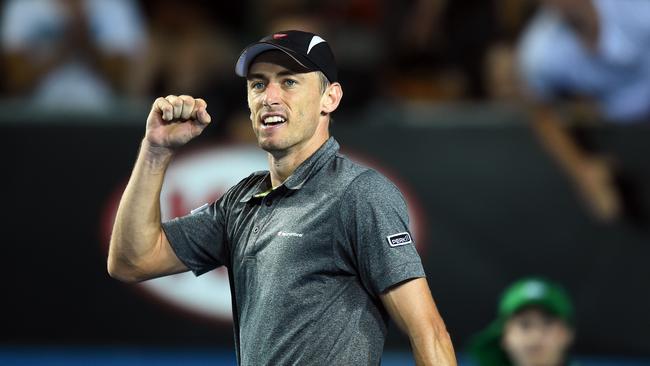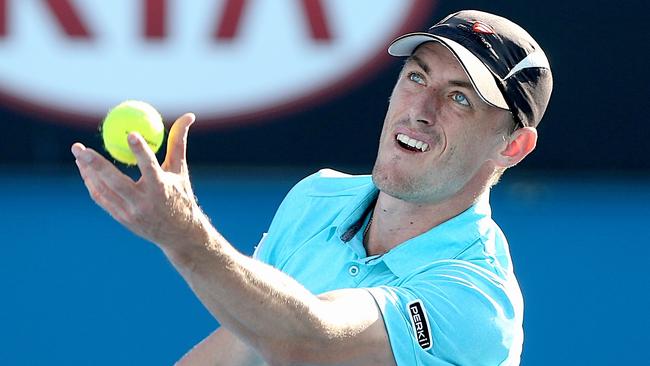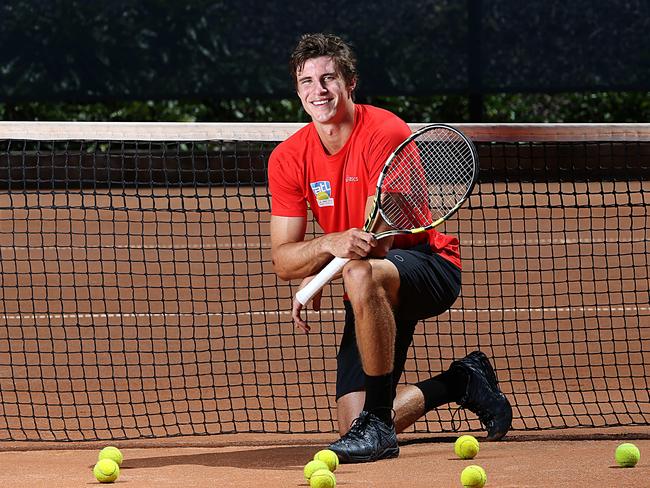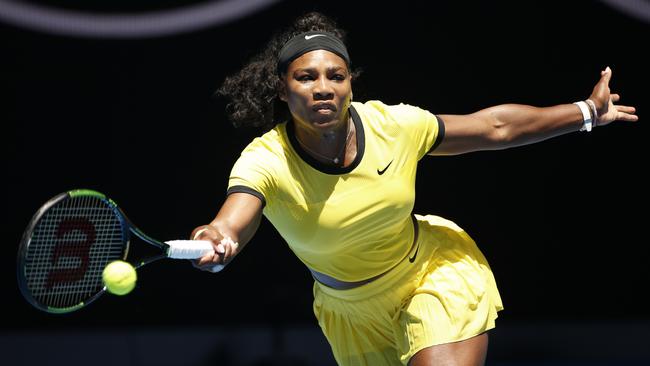Makeshift airport beds and getting robbed: John Millman on life for lower-ranked players on tour
MAKESHIFT beds at airports and getting robbed. In 2016, the Herald Sun's Danny Russell wrote about the pressures of life on the pro tennis circuit for lower-ranked players like John Millman. This is his story.

VIC News
Don't miss out on the headlines from VIC News. Followed categories will be added to My News.
AUSTRALIAN tennis journeyman John Millman built a makeshift bed in the departure lounge at Barcelona Airport.
It was the northern summer of 2008. He had finished one minor tournament and was off to the next, scrimping but paying for it in sleep.
Less than 12km away in the Catalan capital, Manchester United had held Barcelona to a 0-0 draw in a semi-final of the UEFA Champions League.
“It was 2am and I’m trying to settle in and sleep for the night,” Millman says.
“It’s a marble floor, it’s freezing. I’m kind of in and out of sleep, and I’ve got every bag wrapped around me because I don’t want them to go missing.
“And then the airport erupts in song.

“It’s all the Manchester United fans. They’ve just finished the match and they’ve had a few drinks, and they were catching direct flights to Manchester out of Barcelona.”
Millman, 26, can still see the funny side of the absurd situation, but the following days were tough. He found himself back on court, in another tournament in another city, and craving sleep.
“It isn’t the ideal preparation,” he says. “And it’s not (just) me — many, many, many players have to do that when they are starting out.”
For the thousands of cash-poor professionals who don’t share Novak Djokovic’s superior talent or who exist outside Serena Williams’s imaginary bubble, a life in tennis is the ultimate gamble.
The lure of ranking points and a coveted place in the world’s top 100 can drag the wannabes, the grifters and the grafters to the far-flung corners of the earth.
Every cent counts, and the risks can be great.
Stories are told of rookies, having forsaken an education to follow their dreams, being rorted and robbed. One player recalled his friends putting their bags in an unauthorised taxi at a South American airport only to stand by helplessly as the driver and their belongings sped off.
LIVE: FOLLOW ALL THE AUSTRALIAN OPEN ACTION HERE
Millman, a Queenslander, learned to subsidise his nomadic lifestyle by playing club tennis in Germany and Switzerland.
The first thing for which he made an allocation on his newly configured budget was money for an airport hotel.
Millman, a late starter on the circuit after finishing year 12, backed himself, and now the grind is starting to pay off.
Today the world No. 95 plays in the third round of the Australian Open — a guaranteed cheque of $108,000.
From day one of his professional career he embraced the challenge, embraced the fight, and was never tempted to take a shortcut. Not like others.

Guillermo Olaso is one name that came up at the Australian Open this week as an example of the perils of match-fixing.
In 2013, the 25-year-old Spaniard was banned for five years by the Tennis Integrity Unit for fixing matches outside the ATP Tour.
His lawyers claimed he was the victim of the Russian betting mafia. It held little weight. At the time, he was the world No. 236.
The ramifications of illegal gambling have been felt much closer to home — minus the tentacles of the underworld.
LLEYTON HEWITT HAILED FOR CHANGING TENNIS FOREVER
Former Sydney professional Nick Lindahl, 26, and once ranked in the top 200, is facing criminal charges that he threw a match at a Toowoomba Futures tournament in September 2013, so another former player and his friends would win thousands of dollars.
The charge is not proven, but a tournament in Queensland’s sixth largest city is a long way from the glitz and glamour of a grand slam tournament.
Former tennis player Matthew Fox, 27, of Brighton, was convicted and fined $2000 in Melbourne Magistrates’ Court in 2014 for using corrupt information to bet on tennis.
Fox won $1416 on one match, and $2718 on another.
It is a pittance compared with the $US200,000 that Djokovic says he was indirectly offered to throw a match in 2007.
The world No. 1 says he never entertained the bribe. Why would he?
He had the talent, and now he has the money.

Djokovic is one of the richest sportspeople on earth — in 2014 he reportedly earned $48 million. If he wins this year’s Australian Open he will net another $3.4 million.
When allegations of corruption began to pervade the Melbourne Park corridors this week, retired Wimbledon champion Pat Cash said top-flight players and their bulging bank balances were immune.
But he could understand the temptation for the “have nots” to take an easy way out.
Cash believes the ranking poverty line begins at 75 for men, and somewhere from 50 for women.
“It’s hand-to-mouth. You’re rooming with mates, you’re bumming rides here and there; you do stringing on the side, or coaching at the back of your club to make money and try to get to the next tournament,” Cash said.
Ben Mitchell didn’t make this year’s Open draw, but he’s another Australian who has navigated the bumpy, potholed back roads of professional tennis.

He once played 11 tournaments in five countries in 12 weeks — he could not afford a financially crippling week off, but the workload almost broke his back.
“I don’t mind the little, small towns. I find the people are more friendly and more appreciative,” Mitchell says.
“But I have been to some very bad places. The worst was probably Pinggu in China. They had never seen people like us before.
“When I was with a previous coach, Ben Mathias — he is 6 foot 6, 6 foot 7, and I think they thought they were seeing a dinosaur.
“We were eating fried rice for lunch but nothing for breakfast. I had seven gels for breakfast one morning — that was it.”
Players, coaches and all accredited personnel, including umpires and media, are barred from betting at the Australian Open.
Despite the irony of the event being sponsored by bookmaker William Hill, betting websites are blocked on the Open’s wireless network, as a safeguard against match-fixing.
RE-LIVE LLEYTON HEWITT’S 10 GREATEST TRIUMPHS
But former Wimbledon champion John McEnroe remembers a time when there was gambling at the All England Club.
“A lot of players know a lot about tennis, and guys would be throwing bets down because they knew, like, it was going to be a mismatch if a grass-court guy was playing a clay-court guy,” McEnroe told the Los Angeles Times.
“Not only that, but if you were on site and saw a guy limping, you could go place a bet down.”
For punters, successfully backing an underdog reaps rewards.
This week in Melbourne has been no exception.
A bet on Fernando Verdasco to beat Rafael Nadal in the first round paid $8.50, while new Australian Daria Gavrilova’s defeat of sixth seed Petra Kvitova returned $4.
There is no suggestion that any tampering was involved, but Australian corporate bookmakers have set up risk departments to monitor any irregular or illegal betting and they have a direct link to major sporting authorities to help maintain sports’ integrity.
LIVE: FOLLOW ALL THE AUSTRALIAN OPEN ACTION HERE
They are concerned by the existence of illegal, offshore websites and the unsavoury characters they attract.
Australian Thanasi Kokkinakis revealed shadowy figures lurking on social media had offered him cash to drop matches.
But a star on the rise has too much to lose — the Tennis Integrity Unit can issue $350,000 fines and ban players for life.

Tanking is a prospect that has never seduced champion Serena Williams, who admits that as a multiple champion of Grand Slam events she lives a sheltered life.
“I think that … as an athlete, I do everything I can to be not only great, but … historic,” she said this week.
“If that’s going on (match-fixing), I don’t know about it.
“I’m kind of sometimes in a little bit of a bubble.”
American Austin Krajicek, a second-round loser at Melbourne Park, believes it takes $100,000 to break even on the tour.
He books his own hotels and travel and in the past, when he didn’t have enough spare coins to do his washing at a laundry, he’d wash his sweat-stained gear in the bathroom basin.
“There’s not a whole lot of guys making that money outside the top 150,” the world No. 103 says.
“Then, if you have a coach, it doubles everything.”

Millman does not begrudge top-flight stars such as Federer, Djokovich and Williams making millions each year.
He believes they sell the sport — they put bums on seats and boost ratings on TV.
But the Aussie battler says the answer to the risk of corruption lies in more money at the lower levels.
Roger Federer, in part, disagrees.
“It doesn’t matter how much money you pump into the system,” the winner of 17 Grand Slam tournaments says.
“There’s always going to be people approaching players, or people, (in) any sport. It’s all a question of money, you know.
“I agree we should have more money at futures, challengers, all these levels (of tournament play).
“But it’s not going to solve the issue,” he insists.
“The issue is elsewhere — in the player’s mind.”


